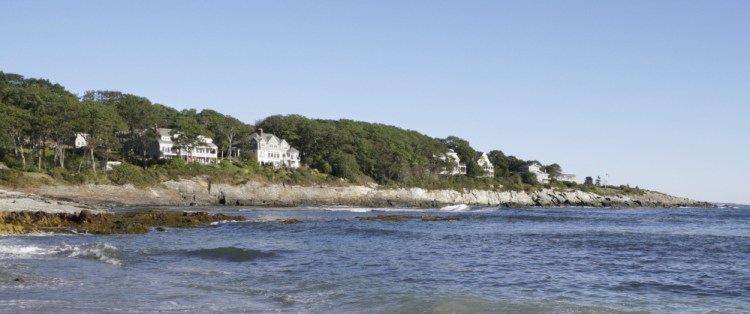CAPE ELIZABETH — The town has hired a professional firm to help residents of the Shore Acres subdivision figure out what to do about two never-built streets that now divide their waterfront neighborhood.
Town officials have scheduled two sessions in February – on a Thursday evening and a Saturday morning – to ensure that everyone involved has a chance to share their views on the so-called paper streets controversy.
But some residents have already told town officials they have no interest in participating, which could throw a wrench in the Town Council’s effort to work out a community-based a solution to a potentially costly legal conflict.
“Some of the abutters have said they don’t see the benefit of participating,” said Town Manager Matt Sturgis. “But there’s plenty of time between now and then. They might change their minds and decide to participate.”
The council struggled through last fall to resolve the dispute over a 2,000-foot-long stretch of paper streets that runs between the rocky shore of Broad Cove and several multimillion-dollar homes on Pilot Point Road.
The would-be streets – Atlantic Place and a section of Surf Side Avenue – appeared on a 1911 subdivision plan but were never built.
And while inland residents of Shore Acres have long enjoyed the deeded right to hike along Broad Cove, their newer waterfront neighbors want to stop the town from extending that right to the general public.
Efforts to reach waterfront property owners whose land abuts the paper streets were unsuccessful Tuesday.
PROPERTY RIGHTS DISPUTE
The council decided in October 2016 to extend the town’s right to accept the paper streets for an additional 20 years, but Pilot Point Road residents and some of their neighbors are pushing the town to take definitive action now. Durward Parkinson, an attorney for the town, has warned that a decision to either accept or vacate the right could embroil the town in costly and protracted lawsuits.

At a crowded meeting in November meeting, the Cape Elizabeth Town Council heard public testimony.
At a packed November meeting, the council was scheduled to either vacate, accept or continue to extend the town’s right to accept the paper streets. Councilors heard lengthy testimony from residents and tossed around several options, such as holding a nonbinding referendum to gauge community sentiment and seeking an easement from the abutters before vacating the paper streets.
Finally, the council voted unanimously to again delay a decision until 2036 and hire a facilitator to help the neighborhood work through its concerns and inform future council actions.
SEEKING COMMON GROUND
Good Group Decisions of Brunswick will facilitate two-hour sessions on Feb. 1 and 3, when they will moderate discussion and report on points where participants agree, disagree and are open to negotiation. The firm will be paid $2,500. Any town resident may attend. A report is due in March.
The town manager remains optimistic.
“I’m hoping we can have a well-rounded discussion and examine the situation from all perspectives,” Sturgis said. “It’s a final attempt to find common ground on a polarizing issue.”
The town’s Conservation Committee identified Surf Side Avenue and Atlantic Place as potential trails in the town’s 2013 Greenbelt Plan, but it has no plans to install a trail there at this time.
A petition signed by 752 residents last fall asked councilors to accept the paper streets “so they will be protected forever and for all Cape citizens to enjoy.”
The general public currently doesn’t have the legal right to be on the paper streets.
Send questions/comments to the editors.



Success. Please wait for the page to reload. If the page does not reload within 5 seconds, please refresh the page.
Enter your email and password to access comments.
Hi, to comment on stories you must . This profile is in addition to your subscription and website login.
Already have a commenting profile? .
Invalid username/password.
Please check your email to confirm and complete your registration.
Only subscribers are eligible to post comments. Please subscribe or login first for digital access. Here’s why.
Use the form below to reset your password. When you've submitted your account email, we will send an email with a reset code.